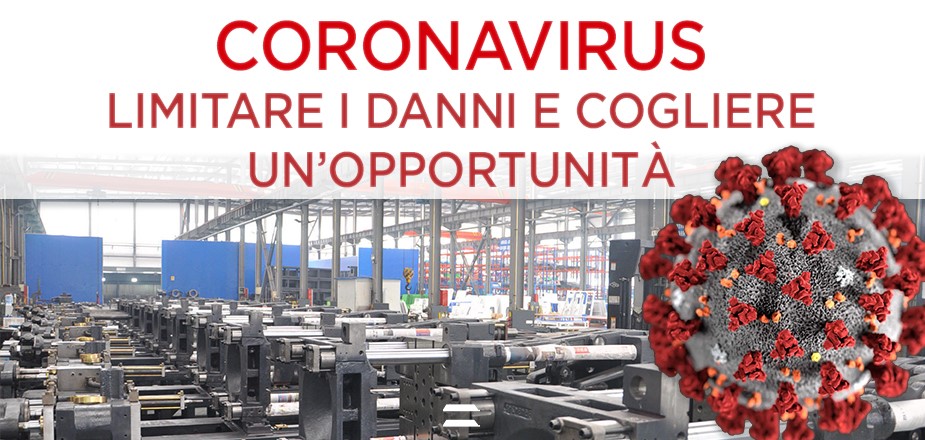Italian Supply Chains have experienced emergency and alarm days, due to the Coronavirus. This virus has been affecting supply and production chains worldwide for some time, especially those belonging to the technology industry. In this situation, business continuity strategies will therefore prove fundamental and for some companies it could also be an opportunity to evolve towards a more modern, agile and aggressive Supply Chain.
The Coronavirus and the Consequences for Manufacturing Supply Chains
The problem for global supply chains stems from the fact that the Coronavirus outbreak originated in the city of Wuhan, in the province of Hubei: a major industrial hub located in central China. For this reason, the virus has severely and suddenly hindered both logistics operations and production activities. There have therefore been serious delays in shipments and a heavy slowdown in industrial production throughout China, in the automotive, pharmaceutical and hi-tech sectors.
Therefore, in addition to the risk of contagion, the epidemic also entails this non-negligible economic impact: the slowdown or even the interruption of logistics and production activities.
Today’s Threats to Manufacturing Supply Chains
The Coronavirus is just one of the many risk factors that can impact Supply Chains worldwide: other threats that production and supply chains are experiencing are Brexit, the trade war of tariffs between the US and China, “cyber-attacks“, changes in regulations, volatility of demand, changing consumer needs, decarbonisation and environmental sustainability objectives.
Supply chains, or Supply Chain, are today increasingly complex and interconnected at a global level and therefore are potentially more fragile, as they are sensitive to events, risk factors and volatility that are increasingly on a global scale and no longer just local. In addition to this, these risk factors are also growing in absolute terms.
Ensuring Business Continuity
In this context, companies must guarantee the necessary “business continuity” and therefore the sustainability of operational activity. To do this, it is essential to have an agile Supply Chain, which can react quickly to external events and which is monitored and guided thanks to advanced tools. These tools use advanced supply chain analysis and simulation of alternative scenarios and are useful supports for making decisions both in the short and long term (for example, modifying a production plan, drawing on alternative suppliers, moving production activities from one plant to another, etc.).
It is therefore important to develop a culture and skills in this regard, within your Supply Chain, that allow you to identify, classify and manage the main risks based on advanced analysis and planning that use simulations of future scenarios. Hazardous events can thus be assessed and their consequences anticipated to minimise or even avoid their impact.
Forward-looking ability to drive the Supply Chain
These capabilities and benefits can be obtained thanks to modern and effective tools, developed over the last decades for manufacturing companies. There are, in fact, specific departmental software solutions that allow plant managers and planners to carry out simulations and calculations in advance, regarding future production scenarios. These are APS or Advanced Planning and Scheduling software.
These tools are used for the control and governance of the Supply Chain and are equipped with a series of capabilities:
- management of large amounts of data (Big Data),
- extended visibility into the supply chain and control dashboards,
- analysis of data collected through powerful and advanced algorithms,
- data analysis with reactive analytics (e.g. alerts in the face of critical situations), predictive and prescriptive (e.g. machine learning logics),
- carrying out simulations and assessments of alternative scenarios, including scenarios useful for managing unforeseen events and disasters.
Another interesting aspect for companies is that thanks to APS, different individuals or teams have access to the same data and can easily work even in smart working/ remote mode, something that breaks down the creation of silos, typical of spreadsheets. Implementing an APS is therefore a strategic project for any company and the more the company has plants and suppliers in different countries, the more crucial its role becomes: that of increasing the reactivity and efficiency of the entire Supply Chain.
{{cta(‘ab85071a-d654-4295-bbad-b8e8302eeff7’)}}
An opportunity for manufacturing companies
The implementation of an APS solution, such as CyberPlan, represents a great opportunity for manufacturing companies that have not yet adopted it. In addition to the potential of the tool, a project of this type allows the company to equip itself with new processes at the level of the company ecosystem (and not only of a single company) as it has impacts on the entire organization. Other positive effects are on people, who gain new skills thanks to the fact that a similar process requires new and distinctive skills.
There are already several APS solutions on the market, among them, CyberPlan is certainly an extremely advanced and advanced solution, tested by leading manufacturing companies around the world, and is now available in the Cloud version. The APS CyberPlan focuses on manufacturing supply chains and collaboration throughout the supply chain, making it possible to communicate between departments and prevent critical situations.
The crisis triggered by the Coronavirus, appropriately addressed, can become an opportunity for ambitious companies to strengthen their supply chain governance system, implementing solutions for the monitoring, governance and control of the production chain. These tools allow the prediction and analysis of phenomena that occur along the supply chains (increasingly global), developing smart working also as a precautionary measure in cases of need and rethinking the industrial footprint, that is, evaluating the hypothesis of moving and/or redundating some of the productions currently carried out only in China in the West.
Companies that have great visibility are therefore more likely to intervene earlier and more effectively on their supply chains, avoiding risks or in any case reducing the repercussions of critical events.
Equip your company with the best tools
Find out how you can help your company and your work, by contacting an expert consultant in Supply Chain issues and discussing with him needs and requirements, which could find its solution in APS software. Talk to an experienced Supply Chain Engineer.
